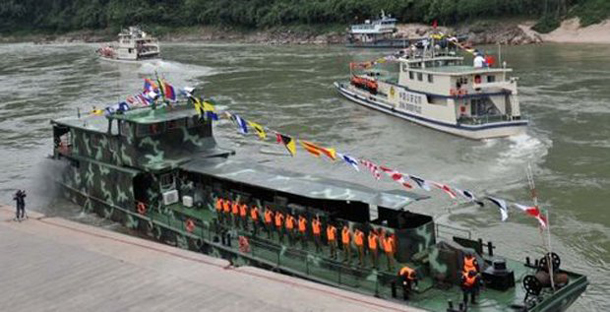CHIANG MAI, Thailand — Burmese officials of the Shan State border township of Tachilek said they attended a regional meeting with officials from China, Laos and Thailand on Wednesday in order to discuss ways to foster economic development and fight the rampant cross-border crime that plagues the Mekong region.
The one-day meeting was the fifth of its kind and was led by China and hosted by the Lao government in Bokeo Province, northern Laos. Officials from China’s Yunnan Province attended the meeting, as did officials from northern regions of Thailand and Laos.
Tin Win Shwe, administrator at Tachilek Township, told The Irrawaddy, “We focused on border trade, hotels and tourism affairs. We talked about how to cooperate and act in accordance with the laws in our respective countries.
“We talked about how to inspect illegal [goods] transport on the Mekong River in our respective territories. It is just to push for more inspection on criminal activities on the Mekong River,” he said.
The Mekong runs along the borders Laos, Thailand, Burma and southern China and forms a rugged region called the Golden Triangle that has long been an epicenter of opium, heroin and methamphetamine production and smuggling in Southeast Asia.
Burmese militias and drug gangs from the neighboring countries often use the Mekong to transport contraband out of the Golden Triangle. Patrolling the river in order to crackdown on illicit activities has become a priority for China after an attack on two Chinese cargo boats left 13 Chinese sailors dead in October 2011.
China weighed upon the Lao government, which arrested Shan State drug lord Nam Kham in 2012 and extradited him to China, where he was executed. Since the incident China has taken unilateral steps to patrol the Mekong, sending patrols far south into parts of the river bordering the other countries, while also stepping up initiatives to boost regional security cooperation.
Bertil Lintner, a veteran Swedish journalist who has written extensively on Burma and drug trade in the Golden Triangle, said China’s commitment to cracking down on crime in the region was a new development, but he added that successful regional law enforcement cooperation is still a long way off.
“Those meetings are pretty meaningless and never result in any concrete action. They can sit together in meetings and sign agreements, but when it comes to actual action then it gets much more difficult,” Lintner said.
“China finally decided to take unilateral action and send their own patrol boats down the river because there was never any joint action with other countries. To the best of my knowledge, there has been little or no coordination with other countries,” he added.

















